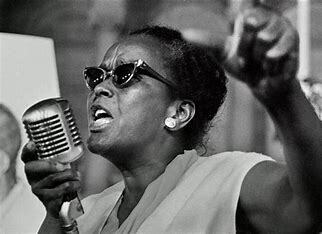When we think of the civil rights movement, the spotlight often shines on charismatic male leaders—Martin Luther King Jr., Malcolm X, or Medgar Evers. Yet behind the scenes, powering the engine of grassroots activism, stood Ella Baker—an unrelenting organizer, fearless strategist, and mentor to generations of young Black activists. Known as the “mother of the civil rights movement,” Baker’s quiet leadership and belief in collective action laid the foundation for some of the most transformative moments in American history.
Ella Baker’s legacy isn’t about personal fame—it’s about people power. She believed in empowering ordinary individuals, especially youth and women, to take charge of their destiny. Her philosophy of participatory democracy, radical humility, and grassroots organizing continues to inspire movements around the globe today.
Early Life and Influences
Ella Josephine Baker was born on December 13, 1903, in Norfolk, Virginia, and raised in Littleton, North Carolina. She came from a strong family rooted in community values, faith, and self-reliance. Her grandparents were formerly enslaved people who went on to own land and emphasized education and dignity as tools of liberation.
Baker’s early life was filled with examples of Black resistance and resilience. Her grandmother’s stories of being whipped for refusing to marry someone chosen by her enslaver left a lasting impression on young Ella. These formative experiences fueled her belief in challenging injustice, even when the cost was high.
She attended Shaw University in Raleigh, North Carolina—one of the oldest historically Black colleges in the South—where she graduated as class valedictorian in 1927. At Shaw, Baker was already resisting authority, challenging the school’s rigid policies and advocating for student rights. This early defiance set the tone for her life’s work.
Early Career and NAACP Involvement
After moving to New York City during the Harlem Renaissance, Baker immersed herself in political and cultural life. She joined various organizations focused on racial justice, economic empowerment, and women’s rights. She co-founded the Young Negroes’ Cooperative League in 1930, which aimed to promote Black economic power through collective buying and worker-owned cooperatives.
In 1940, Baker began working with the National Association for the Advancement of Colored People (NAACP), initially as a field secretary and later as director of branches. She crisscrossed the South organizing local chapters, recruiting members, and educating people on their constitutional rights.
Baker was a firm believer that leadership must come from the people—not be imposed from above. She famously said, “Strong people don’t need strong leaders.” At the NAACP, she often clashed with leadership who preferred a more top-down structure, especially when it came to elevating national figures over grassroots participation. Her experiences with the NAACP taught her the power of listening, organizing from the ground up, and investing in local leadership.
Southern Christian Leadership Conference (SCLC) and MLK
In 1957, after the success of the Montgomery Bus Boycott, Martin Luther King Jr. and other ministers founded the Southern Christian Leadership Conference (SCLC) to coordinate nonviolent protests throughout the South. Baker was invited to help establish the organization and served as its first interim executive director.
While she respected King’s abilities, Baker was critical of the male-dominated culture of the SCLC and its emphasis on oratory leadership rather than grassroots strategy. She believed too much attention was being placed on individual leaders and not enough on empowering communities.
Nevertheless, her work behind the scenes was critical in developing SCLC's organizing framework. She helped coordinate voter registration drives and strengthen local movements. But ultimately, the hierarchical and patriarchal structure of the SCLC conflicted with her democratic ideals. In 1960, a new opportunity emerged—one that aligned more closely with her vision of bottom-up leadership.
The Birth of SNCC: Empowering the Youth
In February 1960, four Black college students in Greensboro, North Carolina, staged a sit-in at a Woolworth’s lunch counter to protest segregation. The movement quickly spread across the South, igniting student activism in cities large and small. Ella Baker, then working at SCLC, saw the energy and potential of this youth-led movement.
In April 1960, she organized a conference at Shaw University that brought student activists together. The result was the formation of the Student Nonviolent Coordinating Committee (SNCC)—an organization that would become one of the most radical and effective arms of the civil rights movement.
Baker played a foundational role in shaping SNCC’s ideology. She mentored its leaders, including John Lewis, Diane Nash, Stokely Carmichael, and Bob Moses. Under her guidance, SNCC adopted a decentralized, collective leadership model that prioritized grassroots engagement over top-down directives. SNCC activists risked their lives organizing Black communities for voting rights, school desegregation, and economic justice across the Deep South.
Baker never sought the spotlight, but her fingerprints were on nearly every major SNCC campaign, from the Freedom Rides to the Mississippi Freedom Summer. She showed young people how to build power from below and hold themselves accountable to the communities they served.
Philosophy and Vision
Ella Baker’s philosophy was radical for her time—and remains relevant today. She believed in participatory democracy—a political system where everyone has a voice and decisions are made collectively. To Baker, change did not come from speeches or marches alone; it came from sustained, local, people-driven action.
She also believed in the intersectionality of struggle long before the term was coined. Baker saw the fight for civil rights as part of a broader global struggle for human dignity, including economic justice, gender equality, and anti-imperialism.
Baker often worked behind the scenes, not because she lacked leadership skills, but because she rejected the "messiah complex" that often dominated civil rights narratives. She wanted to dismantle systems of domination—not replicate them in new forms. Her refusal to conform to the expectations of a male-dominated, hierarchical movement made her both respected and controversial.
Later Life and Continuing Impact
Even after the height of the civil rights movement, Ella Baker continued her activism into the 1970s and 1980s. She worked with organizations like the Puerto Rican Solidarity Committee, the Third World Women’s Alliance, and the Free Angela Davis Campaign. Her activism was always intersectional, always international, and always rooted in community.
Baker passed away on December 13, 1986—on her 83rd birthday—but her impact did not end there. Her model of leadership lives on in countless movements, from Black Lives Matter to labor organizing, student protests, and international human rights struggles.
Modern activists often invoke her name and principles. Her belief that leadership is not about fame or hierarchy, but about service, humility, and accountability, continues to guide grassroots organizing today. She remains a powerful role model, especially for women, queer activists, and people of color who are often excluded from traditional leadership narratives.
Legacy and Recognition
Ella Baker’s legacy has gained more recognition in recent decades, though she still remains less well-known than her male counterparts. Documentaries, books, and academic studies now center her as a critical architect of the civil rights movement. Schools, community centers, and activist collectives bear her name. The Ella Baker Center for Human Rights in Oakland, California, continues her mission of advancing justice through community-based solutions.
In her own words: “Give light and people will find the way.” Baker gave light—not through speeches or fame—but through organizing, mentoring, and showing others how to believe in their own power.
Conclusion
Ella Baker was never interested in being famous. She was interested in being effective. Her life challenges us to think differently about leadership—not as a spotlight, but as a service. She worked tirelessly to ensure that ordinary people—especially the poor, the young, and the marginalized—had the tools and confidence to lead themselves.
In a society that still grapples with inequality, exploitation, and systemic racism, Ella Baker’s life reminds us that real change comes from the ground up. Her legacy is not only a chapter in history but a blueprint for the future. She taught us that the movement is not about a few—it’s about all of us. And with that truth, we carry her spirit forward, organizing not in her name alone, but in the name of justice, freedom, and collective power.




Share this page with your family and friends.